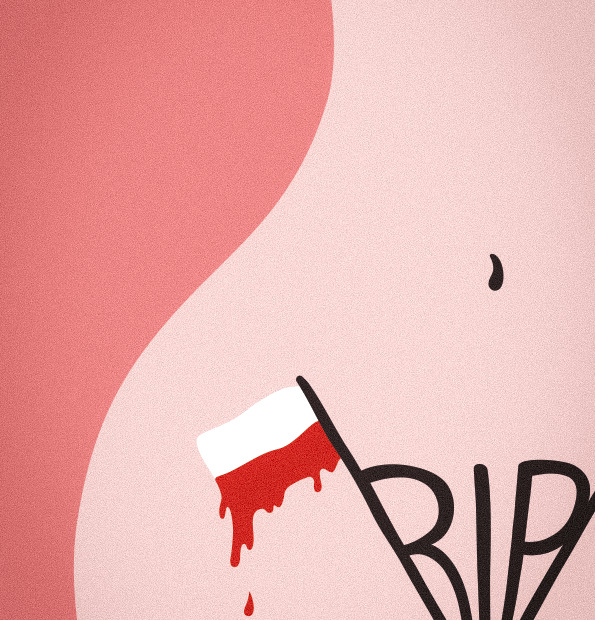This newly-implemented law has been claimed to protect human life “from the moment of conception to the moment of natural death” (Archbishop Marek Jedraszewski, October 22, 2020). But how can you say that you are a defender of human life when you deprive half the population of the right to health and dignity?

My mum is truly of a calm and profoundly restful nature. She grew up in a strict catholic family and passed those values on to my dear brothers and me. At the innocent age of 9, I first overheard my mum and an older cousin Emilia discussing politics – the right to abortion to be precise. I didn’t have the slightest idea of what abortion was, nor any understanding of what it implied. It was the tone of their conversation that kept me listening to them. The passion, the emotions and the rage, which I had never heard before from my mum. She was 7 months pregnant at the time, and my brother was born healthy soon after. We were lucky.
Being a young person, especially a young female in Poland, is not easy. How can this be? Our rights and our dignity have gradually been taken away over the last decade. Many fights have centered around our health and our bodies. Severely constricted access to modern contraception methods, lack of adequate prenatal care, lack of compassion, to name but a few.
The decision to strengthen “the protection of life”, as they are calling it, was made by men in robes, cassocks, and suits, in the middle of a raging pandemic. Polish women have been obscenely used as a cover-up topic for the inefficiency of the ruling party in the struggle against the pandemic. This did not come as a surprise – I grew up witnessing their process of undermining our worth, power, independence, and assigning us “traditional” roles in society. But now they crossed the line.
This newly-implemented law has been claimed to protect human life “from the moment of conception to the moment of natural death” (Archbishop Marek Jedraszewski, October 22, 2020). But how can you say that you are a defender of human life when you deprive half the population of the right to health and dignity? How can I feel safe, knowing that any complications or fetal abnormalities to my mum’s pregnancy at the time, or any other woman’s, could threaten her health, and even her life? How can I feel safe, knowing that no one will protect my own life when worse comes to worst? When did girls’ and women’s lives become less valuable than any other? When did our lives lose their value and become secondary?
I currently live in Denmark, a country with values and actions completely contrary to the ones imposed by the government back home in Poland. Here, access to contraception is not restricted, and pregnancy termination is neither illegal nor criminalized. Being here, however, I still feel trapped and defeated. I do not feel safe. Being far from home these times, away from my mum, cousins, friends and fellow polish women, only reinforces these emotions.
It was their final decision and our final trigger.
I keep receiving videos, photos and reports from protests and demonstrations that have been taking place every day across Poland since the abortion ban was imposed. One of the videos shared on social media,showed two lovely, gracefully-aged and white-haired women, surely above the age of 65. They were neighbours, both leaning out of their windows, vigorously pounding their best kitchen pots with well-worn wooden spatulas. While I was feeling defeated, they emanated with a youthful kind of rage and resistance, a profound compassion, and endless strength. This 4-second image empowered me, and brought back my own powerful strength, my voice. Since the passing of this backwards law, people – irrespectively of gender, age, beliefs, and political affiliation – have been taking to the streets in solidarity with all girls and women. We have all had enough. We all demand respect.
We deserve to have agency over our own bodies and health. We should not be forced to become heroines. The ban will not stop us from making those decisions. Abolition of choice and removal of legal access to abortion will only reinforce the peril of “underground” procedures. The adverse health outcomes and complications are known – we have seen them in previous generations, and still in other countries. There will be a physical, psychological, and broadly social impact on society.
Today, on October 31, a few days after the constitutional tribunal, Poland extended the ban on pregnancy terminations to pregnancies with even the most serious foetal abnormalities. I look back at those conversations and could not be more proud of my mother. I am proud of her for starting the conversation as catholic, a mum, and most of all, a fellow woman. I am proud of her for standing up for women, for health, for the freedom of choice. Over a decade passed and yet here we are, spilling our rage and passion over the same topic. Today I speak the same way she did. Today, I understand.
 About the author: Anita Magdalena Zalisz grew up in Poland, where Sexual and Reproductive Health and Rights (SRHR) are not acknowledged nor respected by the governing body. She has graduated from a Public Health BSc degree at the Jagiellonian University with a main academic focus on accessibility of menstrual health, maternal health, as well as sexual and reproductive health and rights among most vulnerable populations such as refugees and low-income populations.
About the author: Anita Magdalena Zalisz grew up in Poland, where Sexual and Reproductive Health and Rights (SRHR) are not acknowledged nor respected by the governing body. She has graduated from a Public Health BSc degree at the Jagiellonian University with a main academic focus on accessibility of menstrual health, maternal health, as well as sexual and reproductive health and rights among most vulnerable populations such as refugees and low-income populations.